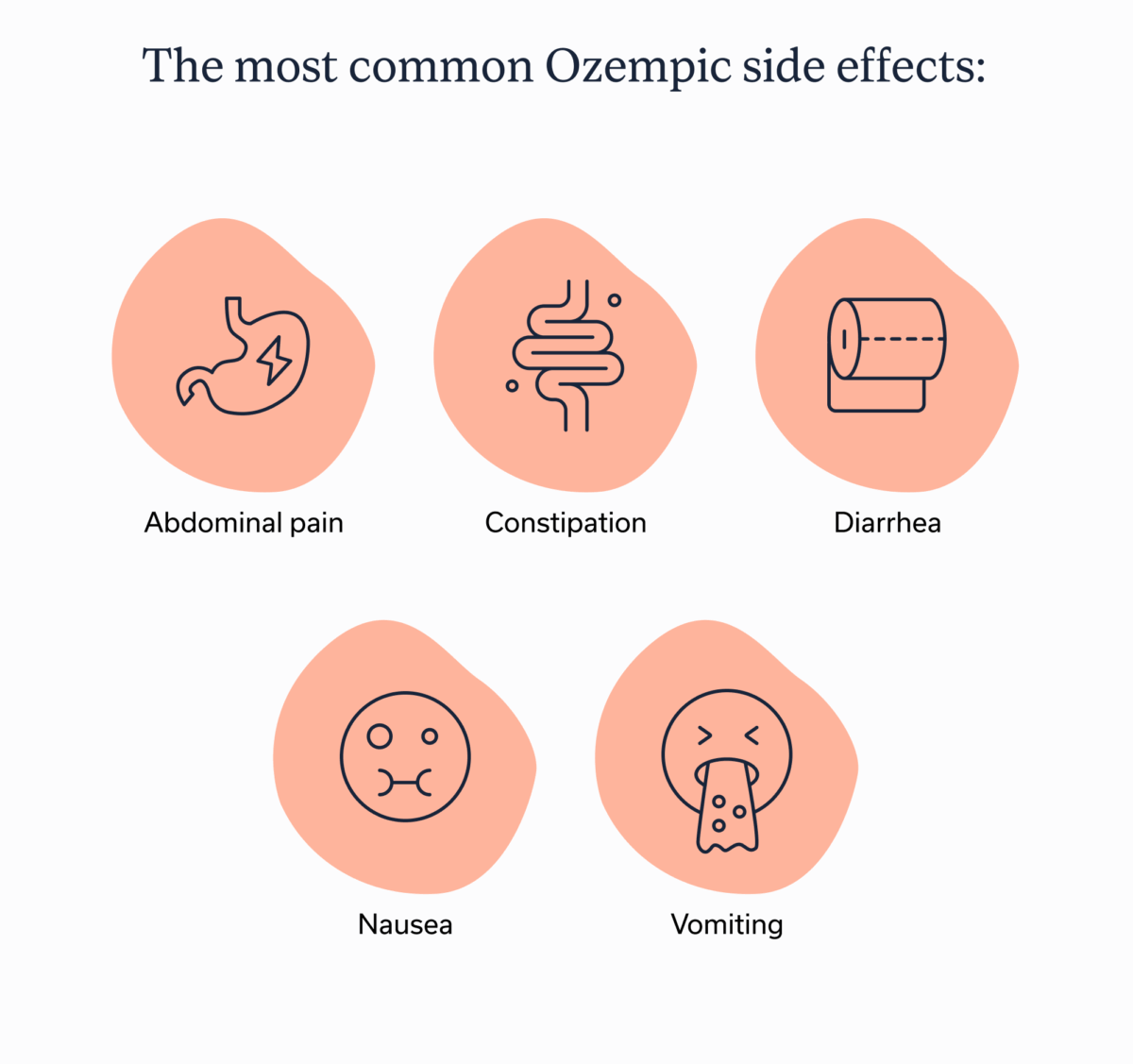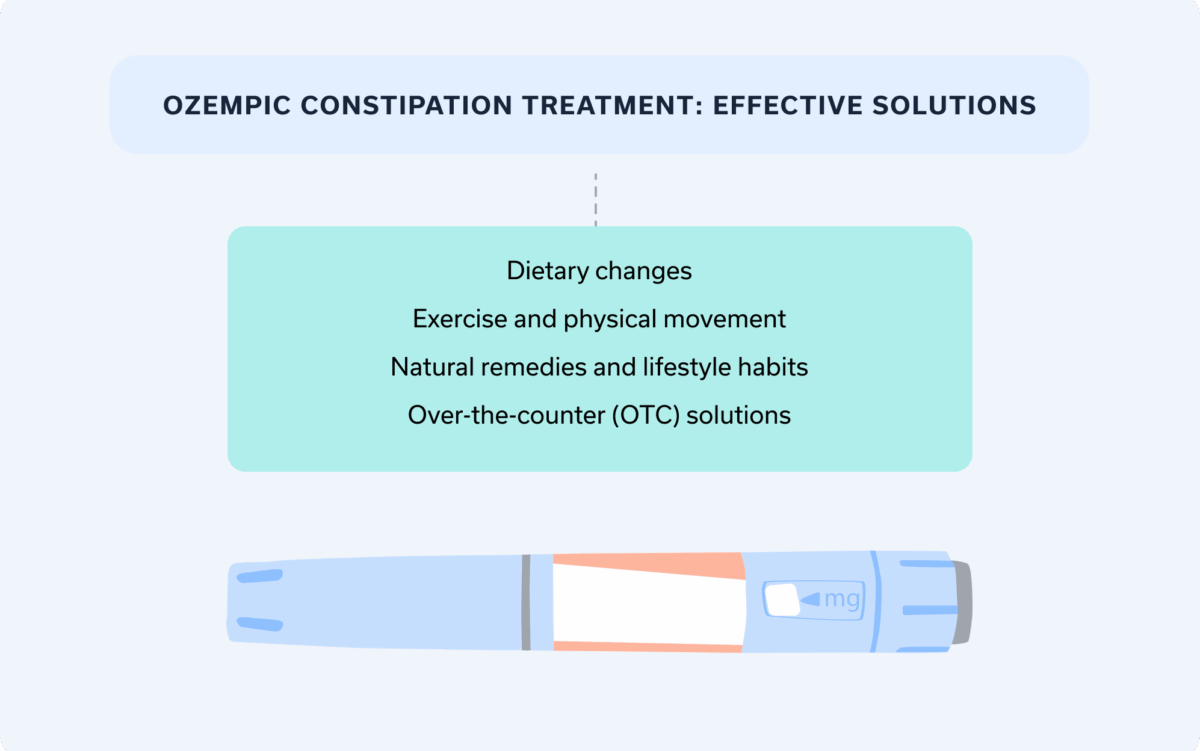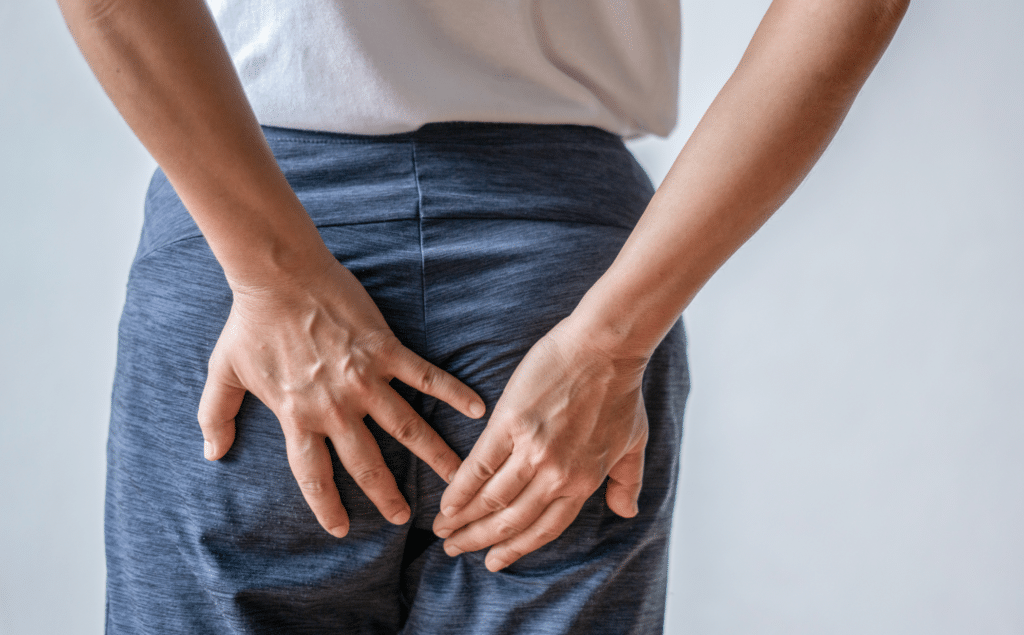Constipation is never fun, and it can be extra frustrating when it’s a side effect to a helpful medication. People who take glucagon-like peptide-1 receptor agonists (GLP-1 RAs), such as Ozempic, may experience constipation. However, some natural and over-the-counter remedies, along with lifestyle changes, may help you find relief and prevent future bouts of Ozempic constipation.
Everyone experiences constipation—the sensation that you need to poop but can’t—from time to time. Or you may feel incomplete relief from going to the loo. Constipation can occur for many reasons, including as an unpleasant side effect of some meds, such as Ozempic.
The situation can be frustrating: Perhaps you’ve finally found a medication that helps treat your type 2 diabetes or manage your weight, but then you also find yourself straining in the bathroom. If you’re one of the hundreds of thousands of Americans taking a GLP-1 RA medication, you may already be familiar with the concept of “Ozempic constipation.”
Ozempic (semaglutide) is a glucagon-like peptide-1 receptor agonist (GLP-1 RA) medication for the treatment of type 2 diabetes. Health care providers also prescribe this medication off-label for the treatment of obesity or weight management.
Regardless of why you’re taking this medication—whether for blood sugar management, weight reduction, or both—you might experience Ozempic constipation as a side effect. Constipation and other gastrointestinal (GI) issues can occur because the medication slows digestion. Even with slowed digestion, you can take some steps to resolve, reduce, and prevent Ozempic constipation. Let’s dive in.
Why does Ozempic cause constipation?
To answer this question, we need to unpack what Ozempic is and how it works.
Ozempic is an injectable prescription drug. The Food and Drug Administration (FDA) approved the medication to treat type 2 diabetes but health care providers also prescribe it off-label (uses other than originally intended) for the treatment of obesity or to help with weight management. The active ingredient in Ozempic is semaglutide. It’s also sold under the brand names Wegovy (approved to help with weight management in people who are overweight or have obesity) and Rybelsus (an oral option approved to help with blood sugar management in people with type 2 diabetes). Even though each drug has different FDA-approved usages, they are all often used off-label for blood sugar management and weight reduction, regardless of whether that’s the individual drug’s FDA-approved use case. Other GLP-1 medications contain different active ingredients, and some have an added component by mimicking another hormone called glucose-dependent insulinotropic polypeptide (GIP). These medications are called GLP-1/GIP RAs.
Here’s a list of the GLP-1 RAs and GLP-1/GIP RAs currently on the market, along with their brand names.
- Dulaglutide (Trulicity)
- Exenatide (Byetta, Bydureon)
- Liraglutide (Victoza, Saxenda)
- Lixisenatide (Adlyxin)
- Semaglutide (Ozempic, Rybelsus, Wegovy)
- Tirzepatide (Mounjaro, Zepbound); medications with tirzepatide are GLP-1/GIP RAs
GLP-1 medications, such as Ozempic and Wegovy, act like copycats for the GLP-1 incretin hormone that the body produces. The intestines release incretin hormones (also called peptides) into the bloodstream when you eat. GLP-1 is responsible for several functions, but its secretion functioning may not be as robust in people with type 2 diabetes or obesity, when compared with people without these chronic conditions. That’s why taking a medication that mimics GLP-1 may help with metabolic regulation in these conditions.
How the natural GLP-1 hormone works
- It helps with glucose (blood sugar) regulation and improves insulin sensitivity, which can also aid weight loss.
- It impacts the hunger and fullness signals in the brain, helping you feel fuller earlier while eating and longer after.
- It slows gastric emptying, the rate at which food moves from the stomach to the small intestine, also helping you feel more satisfied.
Even though GLP-1 RAs mimic a natural hormone in the body, they do have some potential GI side effects, including constipation, which appears to be more common than diarrhea in patients who reach out to Oshi Health for help.
The most common Ozempic side effects:
- Abdominal pain
- Constipation
- Diarrhea
- Nausea
- Vomiting

How does Ozempic cause constipation?
“GLP-1 receptor agonists like Ozempic basically tell your stomach to slow down, which is great for blood sugar control and appetite, but leads to constipation,” says Michael Bass, MD, a board-certified gastroenterologist and hepatologist and the founding medical director of Oshi Health. “There’s evidence that these drugs affect the gut-brain axis,” he adds, “which might influence motility in more complex ways, but the main culprit is delayed gastric emptying.”
The gut-brain axis is the information superhighway between your gut and your brain. Changes to the axis can impact motility, which can make you feel stopped up. Factors unique to you may also contribute to constipation: These include your hydration status, physical activity levels, fiber intake and other dietary habits, other medications or supplements, and more.
How do you know if you’re constipated on Ozempic?
Dr. Bass says the answer depends on your unique situation. He offers some parameters.
“Less than three bowel movements a week is considered constipation,” he says. “If you’re going from daily to once every few days and it’s dry or feels incomplete, that means it’s causing constipation. If you’re uncomfortable, straining, or dreading the bathroom, your body’s telling you something is off, even if the frequency is technically within range.”
Keep in mind that a condition called gastroparesis also causes delayed gastric emptying and constipation. Gastroparesis is also a less common, but potentially severe side effect of GLP-1 medications. That’s why consulting with a medical professional if you are noticing changes in your GI health is crucial. They can help you rule out or confirm any other reasons for constipation.
Ozempic constipation treatment: Effective solutions
What can you do to find relief from Ozempic constipation? Dr. Bass and team have some solutions.
Dietary changes to ease constipation
Increasing fiber intake in your diet may help you find relief, but don’t forget to also consume extra water, which helps the fiber work its gut-health magic. Aim for 2 to 3 liters of water per day.
Also, consider talking with a registered dietitian who can help you determine the appropriate balance of soluble and insoluble fiber for you. However, 25 to 30 grams of soluble fiber is a good rule of thumb.

Exercise and physical activity to ease constipation
Movement can help get things—ahem—moving. Research shows that physical activity can reduce the risk of constipation and potentially relieve it if you’re already feeling blocked up. Of course, the discomfort from constipation might make you feel like curling up on the couch. Try taking a walk or doing other gentle movements, such as yoga, and see how you feel. Walking, in particular, can help reduce colonic inertia.
Natural remedies and lifestyle habits that ease constipation
Some additional natural options and lifestyle changes that may help you find relief include drinking a cup of warm water, or using a “squatty potty” (or placing a platform under your feet at the toilet to put you in a squatting position). Gentle abdominal massage may also help.
Over-the-counter (OTC) solutions to ease constipation
“Hydration and fiber are the first steps,” Dr. Bass says, “but if that doesn’t work, OTC options are fair game. Start gentle: Osmotic laxatives like polyethylene glycol (MiraLAX) work well and don’t cause dependency. Stool softeners like docusate can help if dryness is the issue. For more stubborn cases, a short-term stimulant like senna can get things moving, but it’s not ideal as a long-term crutch.”
Another option is taking 400 milligrams of magnesium oxide before bed. You can do this regularly without concern for physical dependency.
How to avoid constipation on Ozempic
Once you’ve found relief from a bout of Ozempic constipation, you may be wondering how to prevent the issue from occurring again. Continue with the lifestyle habits mentioned above, such as getting adequate fiber, hydration, and movement. But some additional preventive measures may also help.
“Since GLP-1 meds slow gastric emptying,” Dr. Bass says, “spacing meals out (say, four to five hours apart) can prevent that backed-up feeling. Eating small frequent meals (four to six times per day) is best with a slow-functioning stomach.”
What about medication timing? “Some folks find taking Ozempic in the evening helps them sleep through the worst of the GI side effects,” Dr. Bass says, “but this varies. It’s worth experimenting, carefully, to find what feels best for your body.”
Also consider seeking help from a GI provider. “Oshi Health meets you where you are,” says Dr. Bass. “We’re built to support the day-to-day realities of being on meds like Ozempic by tracking your symptoms, giving practical strategies to manage side effects (like constipation), and offering fast access to providers when you need them.”
He adds, “Issues with your gut are complex. To truly improve symptoms, we need to take a whole-person approach looking at both diet and mental health, not just the gut in isolation. Oshi makes that easy, offering integrated support that goes far beyond what you’d typically find in a traditional gastroenterology clinic.”

When to seek medical help
Although Ozempic constipation may resolve with the methods mentioned above, some situations warrant seeking help from your health care provider. “If you’ve gone more than a week without a bowel movement, and nothing is helping or if you’ve got intense abdominal pain, vomiting, or bloating that won’t stop,” Dr. Bass says, “it’s time to call your doc. Those could be signs of a blockage or something more serious.”
Key takeaways
- If you’re experiencing fewer than three bowel movements per week or a change in bowel habits while taking a GLP-1 RA, such as Ozempic, you may be experiencing constipation because of slowed gastric emptying.
- You can try both natural and OTC remedies to help find relief from Ozempic constipation. Some lifestyle habits may also help keep you more regular while taking this medication.
- The team at Oshi Health can help you manage Ozempic-related GI side effects.
FAQ
-
To treat Ozempic constipation, start with increasing fiber and water intake and engaging in physical activity. If these methods don’t work, some over-the-counter options, such as polyethylene glycol (MiraLAX) and 400 milligrams of magnesium oxide (taken at bedtime), may help.
-
GLP-1 RA medications, such as semaglutide (sold under the brand names Ozempic, Wegovy, and Rybelsus) slow gastric emptying, the rate at which food moves from your stomach to your small intestine. In turn, this GI slowdown can cause a domino effect that slows down waste elimination. Additionally, these meds may also impact communication between the gut and the brain, reducing signaling that helps tell your body to poop.
-
Yes, as long as you are not allergic to any ingredients in MiraLAX, this over-the-counter medication is safe to take when you’re on Ozempic. It will not cause dependence.
-
A few simple tricks may help you empty your bowels if you are experiencing constipation. These include drinking a cup of warm water, placing a platform under your feet at the toilet to put you in a squatting position, and gently massaging your abdomen.
-
Yes, two common side effects of Ozempic include constipation and diarrhea.
-
To treat constipation while taking a GLP-1 RA, start by increasing fiber and water intake and engaging in physical activity. If these methods don’t work, some over-the-counter options, such as polyethylene glycol (MiraLAX) and magnesium oxide may help.
-
The most common side effects of Ozempic include gastrointestinal issues, such as abdominal pain, bloating, acid reflux, constipation, diarrhea, nausea, and vomiting.
Oshi is your partner in digestive health
Feel like your digestive concerns are running your life? You’re not alone—and we’re here to help you find lasting relief.
Oshi Health GI providers, gut-brain specialists, and registered dietitians work together to address your symptoms and find solutions that actually work for you.
Whether you’re dealing with chronic digestive issues or unpredictable symptom flare-ups, our GI specialists deliver:
✔ Personalized care plans tailored to your lifestyle
✔ Science-backed strategies to calm your gut
✔ Compassionate, whole-person care
✔ And so much more!
Ready to take control of your gut health?






